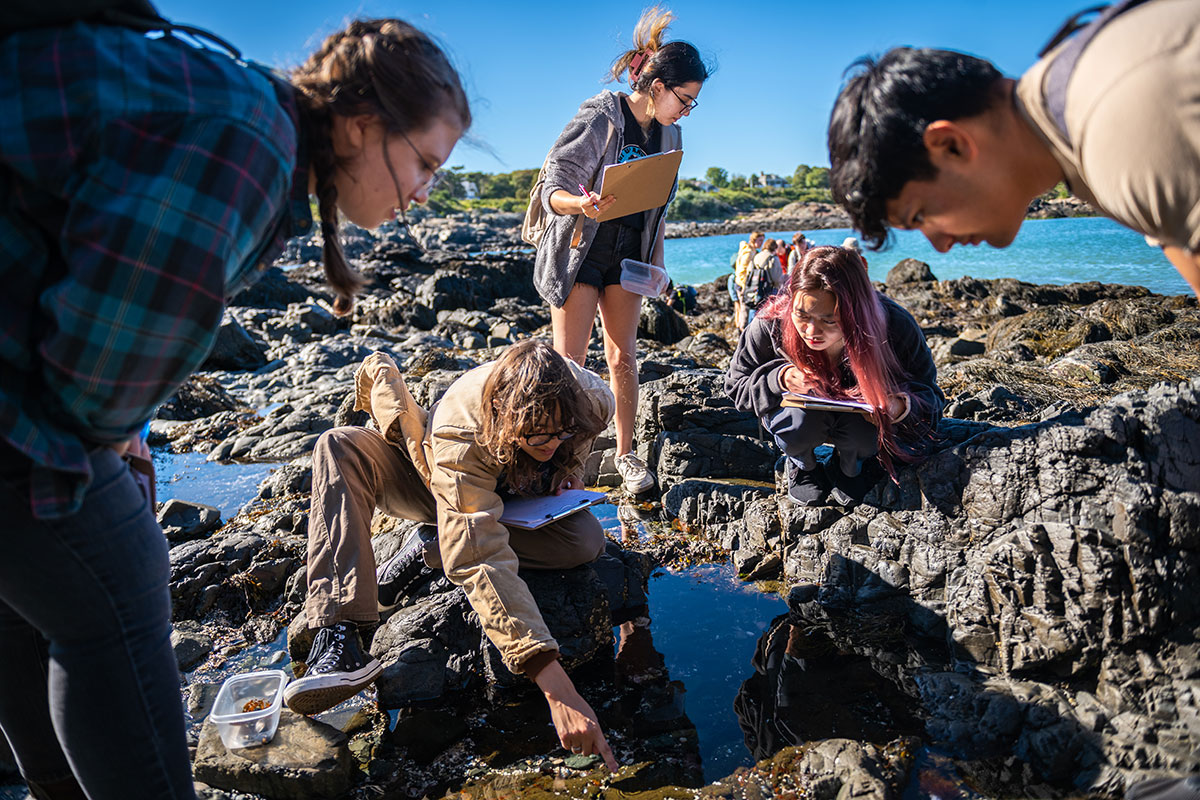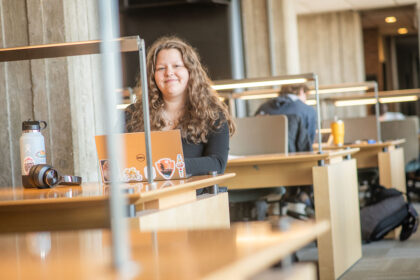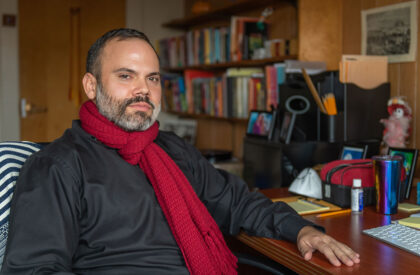Sparking curiosity: Students help faculty build Clark’s new honors experience

A cohort of sophomores helping faculty design Clark University’s new honors experience is keeping an important question in mind: How can we create an above-and-beyond academic program that draws intellectually curious students while adhering to the Clarkie ethos of inclusivity?

“I went to a private high school, but I was there on a generous scholarship. I wouldn’t have been able to go if I didn’t have that,” says Bella Bishop ’26, a first-generation college student participating in this fall’s class, Co-creating an Honors Experience at Clark.
“I want our honors experience at Clark to be diverse and inclusive and to have opportunities for as many students as there are who are eager to deepen their learning.”
“I want our honors experience at Clark to be diverse and inclusive and to have opportunities for as many students as there are who are eager to deepen their learning.”
— Bella Bishop ’26
Keenly aware that many prospective students are drawn to universities with honors opportunities, a faculty committee proposed the initiative more than a year ago as part of Clark Inspired: A Strategic Framework for Our Future. The committee suggested a “design year” — currently underway — with a proposal and faculty endorsement expected at the end of January.
The honors experience will launch next fall; it already is being promoted to prospective undergraduate students in the Class of 2028. An anonymous $1 million gift from a Clark alumnus is supporting the design and launch of the initiative.
“The design year start-up model is a particularly Clarkie approach that encourages students to be creative and take responsibility for their own learning,” says Associate Provost Mary-Ellen Boyle, who became involved with the faculty-led process as interim dean of the college last year. “It allows students to participate in the curriculum and enrichment activities while also designing what honors might be for their future peers.”
Upholding Clark’s values
Bishop and 14 other sophomores were recommended by their First-Year Intensive advisors for the class taught by Juan Pablo Rivera, associate professor of language, literature, and culture. This semester, it meets twice a week, and Rivera will continue teaching the course next spring.
By mentoring students as they create the honors experience, Rivera is guided by the philosophy of “let’s make this happen in a way that makes sense for us as a community so it isn’t some betrayal of our values, but rather upholds them.”
With guidance from Rivera and peer learning assistant Kacey Alcantara ’25, the sophomores are researching other college honors programs, hoping to integrate best practices that align with Clark’s values. They are considering questions like: How do you build an honors experience that does not rely on a GPA-centric approach for admission? How do you attract and select a distinct cohort of students who share a love of learning and curiosity? And how do you integrate this honors approach into the wider Clark community?
More pointedly, Rivera asks them: “How do we keep it from being exclusionary and yet mean something?”
“The meaning of honors has changed for me since I’ve been in this class. When I was applying to college, ‘honors’ seemed like this extra-academic label. But now I see honors as an all-encompassing term that focuses not just on academics, but also on community and interdisciplinary approaches and on the person as a whole. It’s an enriching experience.”
— Kate Placido ’26
To inform their work, students are drawing from assigned readings: Roosevelt Montás’ “Rescuing Socrates: How the Great Books Changed My Life and Why They Matter for a New Generation”; Lorgia García Peña’s “Community as Rebellion: A Syllabus for Surviving Academia as a Woman of Color”; and Paulo Freire’s classic “Pedagogy of the Oppressed.”
Rivera emphasizes the idea of “an honors ‘experience’ rather than a ‘program,’ because it would be something that’s more holistic in the way that students move through the University, rather than something that stands apart,” he adds. “I like the idea of ‘experience’ because experiential learning is something that’s big at Clark. So the idea of ‘experience’ gels well with the ethos of the University.”
That would mean “putting students in charge of their own learning and their own experience,” Rivera says, “while at the same time adding academic seriousness to ensure they are embarking on a valuable intellectual pursuit.”
He also suggests that “there could be certain elements of the honors experience that are required for honor students but open to everyone.” These might include workshops and public lectures.
Preserving and highlighting departmental honors
Clark has a long history of academic enrichment through honor societies and activities and departmental honors programs, where juniors and seniors pursue research opportunities, develop creative projects, and write theses. Currently, 14 percent of undergraduate students graduate with departmental honors, and even more receive Latin honors on their diploma.
“I think this whole idea of having us students contribute ideas for the honors experience is excellent because we’re the closest to it. It does make it a little tricky for us, though, because we’re describing a program that doesn’t really exist yet.”
— Jonathan Tamen ’26
These current honors opportunities will continue to operate alongside the new all-university honors experience, according to Steven Moon, director of special academic opportunities. Undergraduate students will be able to apply for departmental honors programs, the University honors experience, or both.
“There will be ‘on ramps’ and ‘off ramps’ for the University honors experience. When we talked to prospective students and their families at the recent undergraduate admissions open house, we heard that this is very important to them,” Moon explains. “Students will be able to apply for honors when they apply to Clark or once they get here, and if they no longer wish to participate, they can step out.”
To ensure that students are aware of all the University’s honors opportunities, Rivera’s class is conducting an audit that will help inform and populate a centralized, easy-to-navigate website.
“It’s not about reinventing anything or meddling with departmental autonomy, but rather just doing a better job at advertising all of Clark’s honors opportunities and cataloging what is already in place,” Rivera says.
Understanding ‘knowledge production’
To better understand different academic disciplines, he adds, the class is considering what “knowledge production” looks like across undergraduate majors, from those in the arts and humanities to the sciences and technology.

“Clark is known as a place where students can come to do undergraduate research with professors,” Rivera notes. “So we’re looking at what research means in different fields.”
Rivera has invited guest speakers — faculty and administrators — into the classroom to suggest creative ways for students to pursue research and develop engaging academic opportunities, and also explain the University’s structure and how decisions get made within budgetary constraints.
“I have been a professor for 20 years, and I am still learning how the University works,” he says. “We can dream big, but we still have to work within a system that, like most universities, often moves slowly. Creating any change can take a while.”
As part of Clark’s governance structure, faculty committees must sign off on the all-University honors experience, so students involved in its design are remaining flexible about what the experience ultimately might look like.
“A GPA can only tell you so much. There are different ways to be intelligent, there are different ways to be curious, there are different ways that people interact with things. There should be room for flexibility, for collaboration, for different ways of expressing yourself, and for different ways of being seen.”
— Bianca Brezinsky ’26
Building a community of learners
The honors experience aims to attract “intellectually curious students who come together to form a learning community across majors and disciplines,” Moon says. It will emphasize experiential learning beyond the curriculum and include cultural activities and field trips.
“A few weeks ago, we took the students to Boston to see a concert by Anoushka Shankar, a boundary-breaking sitar player,” Moon recalls. “This allows the students to think about liberal education in the everyday world — about the flow of culture, about what we teach, why we teach it, and how students grow into global citizens.”
Bishop looks forward to seeing the honors experience successfully launch. She has been deeply involved in its design not only through Rivera’s class but also as the student representative on the University Academic Board, which reviews proposed courses and academic policy changes.
“An honors experience is not just you sitting in a classroom and wanting to do things by yourself outside of it,” she emphasizes. “It’s being part of a community of people who want to dive deeper into the possibilities of an education.”


